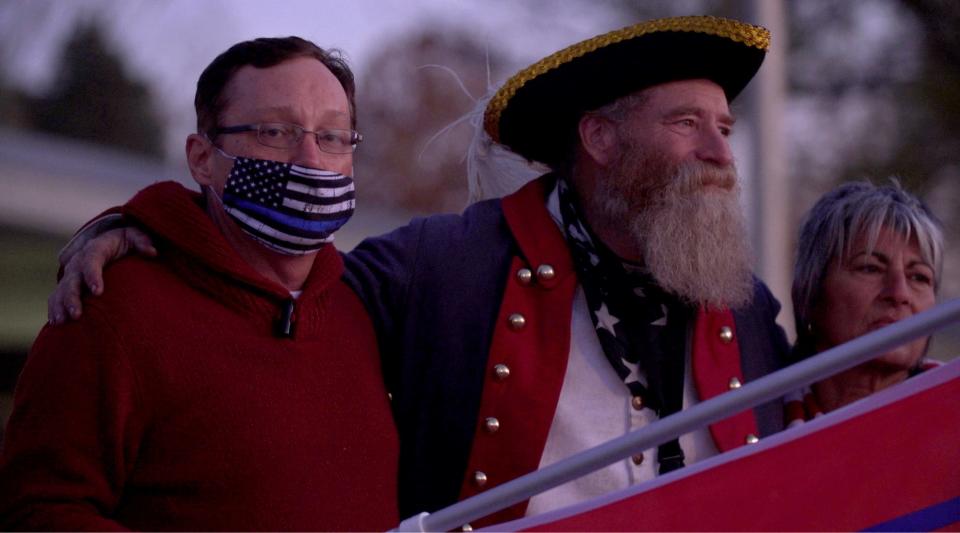True/False pick '23 Mile' is not your typical political film — and that's a good thing

When temptation needles us to define history as the distant past — made of people unlike us and situations unlike ours — artists inevitably come along. They show us how history is being written right here, right now, with every move we make.
Director Mitch McCabe's "23 Mile," premiering at this week's True/False Film Fest, documents the history of the present. As life began closing in on itself during the earliest pandemic days, McCabe traveled home to Michigan, to watch a known world tilt.
To so many, 2020 felt a century long, and McCabe sympathizes, calling it the year that "went on and on" in an email. So their camera stayed on and on, capturing real-time responses to lockdowns, the kidnapping plot against Gov. Gretchen Whitmer, the presidential campaign and more.
McCabe introduces viewers to gun owners and Black Lives Matter protestors, overworked newscasters and Michigan militia men who talk reasonably — until they don't. Even Lizzo makes an appearance.
But the film never feels over-saturated or over-stimulating. "23 Mile" strikes a rare balance, both serene and unsteady in its way, creating a visual diary of a time, a place, and so many of its people.
From True/False 2020 to now
McCabe's 2020 included a stop at True/False, the last major cultural event in Columbia before COVID-19 lockdowns. They carried their short film "Civil War Surveillance Poems — Part 1" here, designed as "the first chapter of an experimental film that contemplates a second and impending civil war," McCabe said.
The filmmaker described their 2020 fest experience both as "amazing" and "surreal." True/False earns an affectionate response from its artists; "there's something about the festival that's so undistracted by the nonsense," McCabe said.
"I don't know how they do it, but it's a festival that truly focuses on a love of watching and making films," they added. "Because honestly, who knows if we have anything more than that?"
And still the medium, the message and the moment collided around McCabe's film in singular, jarring fashion. As the short screened, news flooded in, McCabe said — of cancelations to the NBA and other festivals like South by Southwest.
"So here was a sorta foreboding film with a quasi sci-fi vibe, and the world out there was starting to board itself up," they said. "It was really clear to me that it might be a while till we saw each other again."
Back on the road, camera on, McCabe intended all the gathering Michigan footage to form the last chapter of "Civil War Surveillance Poems." But 2020 kept unraveling and, last spring, McCabe and collaborator Lucas Neufeld looked at a then 3-hour film (the final version is 78 minutes) and "finished each other's thoughts — it needed to separate and be its own creature," they said.
Making sound on-screen judgements

"23 Mile" stakes a refreshing unity of style and substance. So often, the film is visually stunning, immersing as it informs. Creating from a small budget funded by donations and grants affords a certain freedom, McCabe testified. And from within that freedom, "I could mix and match documentary language," they said.
"The conventional film about the subject matter I cover here might have interviews with important public figures," McCabe said. "And I do like watching those, but they don't always make me enter a different world, which is what I love about making and watching films, whether fiction or nonfiction."
The film's sound approach proves key to opening up this world. At distinct moments, we hear Springsteen's "Born in the USA" while a Midwest sun sets inside a rearview mirror; symphonies of car horns along city streets; and crusaders misusing Leonard Cohen's "Hallelujah" in service of their "Christian nation" ideals.
Early and throughout, McCabe soundtracks beautiful, varied visuals with the voices of unseen radio callers, who express all manner of opinion and theory around the events of 2020.
"The radio was a natural way to ground the film in time, and the news cycle, while bringing in a variety of thoughts and voices of 'The People,'" McCabe said.
The people have their say along "23 Mile." McCabe somehow manages to transcend both-sides objectivity, exhibiting affection for every person in the film without giving their every idea equal weight.
"I can't give them (a real political voice)," they said. "I can talk to them and try to understand, and promise that they will not be sound-bitten. It's weird, but the older I get, the more of a 'love your neighbor' hippie I become. Who knew?"
McCabe is quick to say this is not the definitive film about Michigan in 2020. But the filmmaker's care for their home state, which includes both loving and critical gazes a la James Baldwin, comes through clearly.
Such concern causes viewers to want to walk more than a few miles in McCabe's shoes. You want to read their diary, see their history written in real time.
"My scuffing around, my interactions, and even nervous gaffes are all a part of it — small parts, but present and embedded in the experience," McCabe said.
"23 Mile" screens at 4:15 p.m. Friday, 3 p.m. Saturday and 10 a.m. Sunday, all at Ragtag Cinema. Learn more at https://truefalse.org/.
Aarik Danielsen is the features and culture editor for the Tribune. Contact him at adanielsen@columbiatribune.com or by calling 573-815-1731. He's on Twitter/X @aarikdanielsen.
This article originally appeared on Columbia Daily Tribune: True/False film '23 Mile' baptizes viewers in Michigan's 2020 saga

